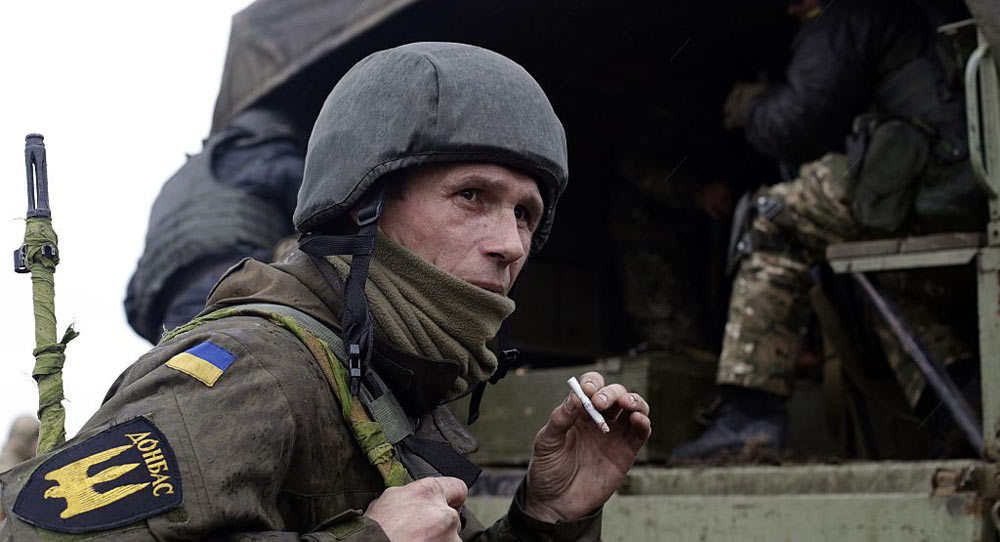Commentators at the final of the Eurovision Song Contest on May 13 kept repeating how normal the host city of Kyiv appeared. However, with a travel ban imposed on the Russian entrant, who had performed in the annexed peninsula of Crimea, the ongoing war in eastern Ukraine left a clear mark on the event. The human and political costs of this war have been high: the total death toll is about 10,000; some 1.8 million inhabitants of the Donbas region have been displaced inside Ukraine; and about 1 million have fled to Russia.
Little attention has been paid to the population of Donbas, in particular the inhabitants of the self-declared Donetsk and Luhansk People’s Republics. Access to these territories has been restricted, and journalists have caught only occasional glimpses of the situation on the ground. The newly founded Centre for East European and International Studies (ZOiS) has conducted opinion polls across the whole of Donbas. Between November and December 2016, 1,200 people were surveyed in both the Kyiv-controlled parts of the region and the occupied territories (the latter by telephone interview).
The survey shows that those living through the war are not characterized by clear-cut ethnic or political identities, the intensity of contact across the front line remains high, and Kyiv-controlled Donbas diverges in parts from the political consensus across Ukraine.
When asked about a change in their personal identity as a result of the events of 2013–2016, one-quarter of the respondents in the occupied territories said they now felt “more Russian”—and one-fifth in Kyiv-controlled Donbas said they felt “more Ukrainian.” Interestingly, however, 14 and 20 percent in government-controlled and occupied Donbas respectively reported feeling more strongly that they were “both Ukrainian and Russian.” Majorities in both parts of Donbas described no change in identity: 62 percent in the government-controlled areas and 45 percent in the self-declared republics. Thus, the war has led to a greater realignment of identities in the occupied territories, although a significant number of respondents reported not only a stable identity but also an increase in a mixed identification.
In Kyiv-controlled Donbas, face-to-face interviews allowed for a more detailed question about identity. Of the respondents, 53 percent picked Ukrainian citizenship as their primary self-reported identity, down only marginally from 54 percent in 2012, demonstrating that a civic identity already prevailed over ethnic or regional identities before the war. Only 7 and 4 percent chose “ethnic Ukrainian” and “ethnic Russian” as their main identity five years ago. These figures have now risen to 11 and 6 percent, respectively. Self-identification as “mixed ethnic Russian and Ukrainian” has risen from 4 to 7 percent over the last five years.
Self-identification as a Ukrainian citizen marks an important difference between the Kyiv-controlled areas and the occupied territories. In the latter, 54 percent reported that they felt less like Ukrainian citizens than before 2013, while only 8 percent stated they felt more like Ukrainian citizens now, and 38 percent reported no change. Thus, a previously strong sense—generally underestimated in the West—of being a Ukrainian citizen has been the price paid during the war.
Looking at the cause of the war, the views in government-controlled Donbas are surprisingly split: 37 percent blame the conflict on Russia and 10 percent on Ukraine. Thirty percent think it was the result of Western intervention, and 23 percent see it as a local reaction against the Kyiv government. The figures for the occupied territories are more similar than might be expected, with the exception of the perceived role of Russia: 50 percent think the war resulted from Western intervention, 30 percent see it as a local reaction against the national government, 11 percent blame Ukraine, and 9 percent hold Russia responsible.
The biggest discrepancy between the two parts of Donbas is over the future status of the occupied territories. In Kyiv-controlled Donbas, a clear majority of 65 percent wants the territories to be parts of the Donetsk and Luhansk oblasts without a special status, while 26 percent think a special status in Ukraine is necessary, and about 9 percent see the future of these territories in Russia.
The views in the self-declared republics are more diverse than might be expected: 21 percent want these areas to be parts of Ukraine without a special status, and 35 percent would prefer a special status in Ukraine. Conversely, 11 percent want to see the territories as parts of Russia without a special status, and 33 percent would prefer a special status in Russia. Thus, the respondents’ main emphasis is on recognizing the territories’ special status, while there is an even split between those who see these areas as parts of Ukraine and those who consider them parts of Russia.
In terms of foreign policy, the two areas of Donbas are more in line than one might have thought. While vast majorities in both parts reject NATO membership, the widespread negative views of the EU might come as a surprise: 72 percent of respondents in government-controlled Donbas and 82 percent in the self-declared republics are against Ukraine joining the EU.
Overall, two trends stand out. First, on some issues, the gap in attitudes between the two parts of Donbas is not as wide as the current political dynamics suggest, in particular with regard to mixed identities, the causes of the war, and relations with the EU. Second, attitudes in the occupied territories are more differentiated than might have been anticipated. Mixed identities across Donbas and a wide range of preferences regarding the status of the area in the occupied territories are factors of which Ukrainian, Western, and Russian policymakers should take note.
Gwendolyn Sasse is a nonresident senior fellow at Carnegie Europe and director of the Centre for East European and International Studies (ZOiS) in Berlin.








.jpg)